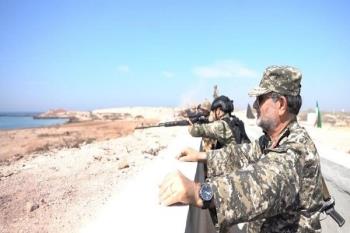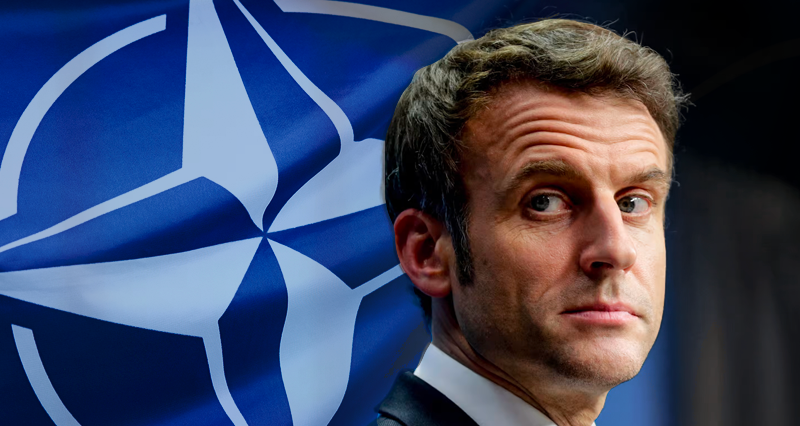Following a conference of Western leaders on Ukraine, Emmanuel Macron, the President of France, made fresh remarks in a press briefing that reinforced his reputation as a taboo breaker. Macron did not dismiss the idea of sending Western forces to Ukraine for warfare during Monday night's session. His statements suggest a readiness to facilitate further direct Western involvement in the Ukrainian conflict and pave the way for NATO to decide on deploying forces to Ukraine.
ALWAGHT- Emmanuel Macron, France's President, recently endeavored to introduce "strategic ambiguity" by directly proposing the notion of deploying Western forces to Ukraine. However, his statements were so unclear that they stirred confusion and resentment among some of France's NATO allies.
Macron's latest declarations, delivered during a press briefing following a gathering of Western leaders to discuss Ukraine, once again positioned him as a trailblazer in challenging norms. On Monday night, Macron did not outright oppose the deployment of Western forces to Ukraine for combat. His remarks suggest a readiness to facilitate more direct Western involvement in the Ukrainian conflict and to allow the West to make decisions about deploying forces to Ukraine within the NATO framework.
Nevertheless, Macron's comments failed to garner significant support among Paris' allies. Leaders from countries like Germany, Sweden, and even the NATO Secretary-General dismissed the idea of sending military forces to Ukraine. Macron's statements arguably weakened Western solidarity against Ukraine and underscored the lack of a unified approach among NATO member states toward the Ukrainian conflict. While nations like France advocate for sending forces to Ukraine, others like Germany oppose such action. The White House also declared its decision not to deploy forces to Ukraine. Furthermore, the UK, Italy, Spain, Poland, and the Czech Republic promptly rejected the notion of sending military forces to Ukraine.
France's Retreat
The French President's comments regarding the dispatch of military forces to Ukraine elicited a significant response from Russia. The Kremlin has asserted that the introduction of NATO forces into Ukraine will heighten the risk of a direct clash between NATO and Russia. The mere discussion of a Russia-NATO standoff underscores a profound escalation in tensions between the two parties. Thirty-two years post the Soviet Union's collapse, the West and the East find themselves entangled in one of their most severe crises in recent memory, with Western forces, despite initial assertions, achieving little for Ukraine.
Dmitry Peskov, spokesperson for the Russian presidency, further declared that should Western forces be deployed to Ukraine, a confrontation between NATO and Russia is not merely a possibility but an inevitability.
Following Moscow's position and cautionary remarks regarding the deployment of Western forces to Ukraine, French authorities endeavored to modify and refine the statements made by their nation's president. "Stephane Sejourne," the French Minister of Foreign Affairs, informed legislators in the country's parliament that Macron's intent behind sending military forces to Ukraine was for purposes such as mine clearance, cyber defense, on-site weapon production, and training. France's stance signals Paris's attempt to distance itself from Macron's earlier statements.
Tension in France within Western Europe
Macron's statements have also heightened the risk of increasing tensions between France and Germany, two nations whose partnership lies at the heart of European political collaboration. It seems that Paris is pushing Berlin to supply offensive weaponry to Ukraine, yet Berlin is reluctant to align closely with Paris's objectives. Privately, German officials have recently criticized France for what they perceive as insufficient military assistance to Ukraine. According to a Western official cited by Reuters, Macron's actions have disrupted the internal cohesion of NATO and fostered discord among its members.
Moreover, this Western official suggested that France's stance could complicate and stall the passage of the US Congress's $60 billion aid package for Ukraine. An EU diplomat added that Macron's statements have resulted in "uncertainty among allies."
Eastern Europe Welcomes Macrons Proposal
Despite facing opposition in Western European nations like Germany, Italy, Spain, and others regarding the dispatch of military forces to Ukraine, Macron's suggestion found favor in Eastern Europe. According to reports from the Swiss Info website, which cites officials from the region, there was endorsement and emphasis on the notion of deploying military forces to Ukraine. It was stressed that the West must define its calculations and red lines to Putin, ensuring that Russia's interpretation of the West's position does not appear as a sign of weakness. Gabrielius Landsbergis, Lithuania's Foreign Minister, remarked, "Paris's proposal for deploying forces to Ukraine warrants serious consideration." Additionally, a diplomat from Eastern Europe commented, "In my view, what Macron expressed is valuable, and the public senses its urgency."
The acceptance of Macron's proposal in Eastern Europe for deploying military forces to Ukraine arises from historical apprehensions of Eastern European nations confronting Russia. Given their longstanding concerns about Russia's proximity, Eastern European countries dread the prospect of a recurrence of the Ukrainian scenario in other parts of Eastern Europe. Hence, Eastern European nations endorse Europe and NATO's resolute stance against Russia's actions.
Available Options
Although France endeavored to broaden Western strategies against Russia through suggesting the deployment of military forces to Ukraine, the withdrawal of other significant NATO members like the UK and Germany from considering sending forces to Ukraine indicates that the West's stance against Russia in Ukraine is not entirely flexible. Presently, the sole Western alternative against Russia entails furnishing military equipment and financial assistance to Ukraine. Beyond this, Western nations and NATO lack a varied array of options to bolster support for Ukraine.



























